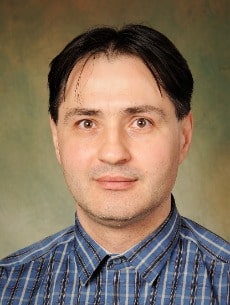
Ilian Todorov is principal scientific officer at the Science and Technology Facilities Council (UK) where he leads the Computational Chemistry group, based at Daresbury Laboratory.
Ilian Todorov received his first degree in Theoretical Physics in 1996 from the University of Sofia, where he defended his MSc with theoretical work on Hamiltonians to describe collective excitations of atomic nuclei using the Quasiparticle Random Phase Approximation, derived from the time-dependent Hartree-Fock-Bogoliubov equation. After completing his military service in the Bulgarian Air Force in 1997 he was awarded a trans-Europen scholarship (TEPMPUS) at University of Sofia and carried out a research project at the Surface and Colloidal Chemistry Lab at the University of Hull, receiving a joint MSci in Chemistry in 1999. In the same year he was awarded UK’s ORS and University of Bristol scholarships and joined the group of Prof. Neil Allan to specialise in Computational Chemistry methodology. There he studied the thermodynamic properties of ceramics under extreme conditions by using computational techniques such as Quasi-harmonic Lattice Dynamics and Monte Carlo, and also advanced their development by writing software.
After completing his PhD in 2001, Ilian Todorov took the opportunity to join the eMinerals project, led by Prof. Martin Dove at University of Cambridge, as a research assistant and application developer. He was seconded at Daresbury Laboratory where he worked closely with Prof. William Smith on the software development and application of DL_POLY, prior to becoming one of the principal authors of DL_POLY. Ilian Todorov worked on various aspects of HPC technologies related to scalable performance and numerical stability of algorithms for molecular dynamics as well as software interoperability via CML (DL_POLY and SIESTA). Active as Research Software Engineer, he also carried out modelling research with Kostya Trachenko in the area of characterisation of damage in ceramics, glasses and metals subjected to irradiation. Ilian Todorov was actively involved in materials communities such as MCC and CCP5 by contributing talks and associated computational training. In 2007 Ilian Todorov joined Darebusry Laboratory as an HPC expert at Advanced Research Computing group, later joining the Computational Chemistry group in 2010 and then taking the group lead in 2014. In 2017 Ilian Todorov took his Visiting Professor title at Queen Mary University of London in 2017, based on the joint research with his collaborator, Prof. Kostya Trachenko.
Ilian Todorov’s main scientific interests are in the area of soft condensed matter and particularly in modelling and understanding materials behaviour under irradiation in glasses, ceramics and metals. His main technology research interest are in the areas of development of research software for molecular simulations, the interoperability of software in larger infrastructures (ontologies for marketplaces) and the sustained and continual development of the software and the people behind it (Society for RSE, BCS). His group at STFC has developed a number of packages such as DL_POLY, DL_FIELD, DL_MESO, DL_MONTE, ChemShell, etc. and are involved in number of project lines including simulation based research, research software development and marketplace development.
Ilian Todorov is the author of about 80 scientific publications.
Software Business Models
Software has been a key component of research for decades. It has usually been associated with modelling, experimental characterisation processing and data digestion for analytics purposes.
Nowadays, the value of software goes much beyond being a fundamental part of research [1], as materials modelling software has become a key enabler for business decision making in process and manufacturing industries and a crucial driver for materials discovery and innovation in a wider sense.
The talk will outline preliminary findings from the Software Business Models survey as principal components in software sustainability and evolution in the area of materials modelling and characterisation. The key feedback from our communities – including research service providers, software vendors and other industry – is split in three categories: materials data semantisation and standardisation [2-3]; support for marketplaces [4-6] as innovation spaces; and flexible workflows.